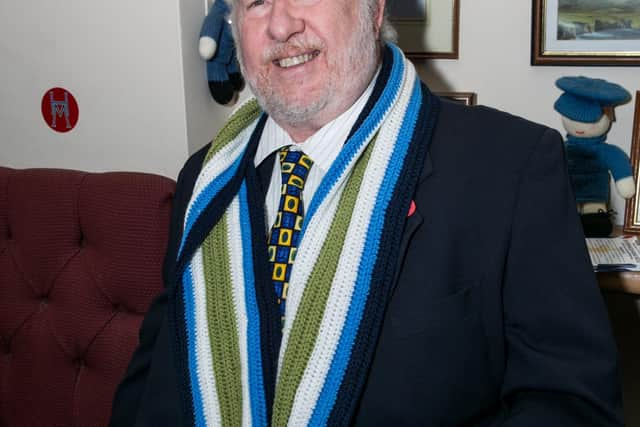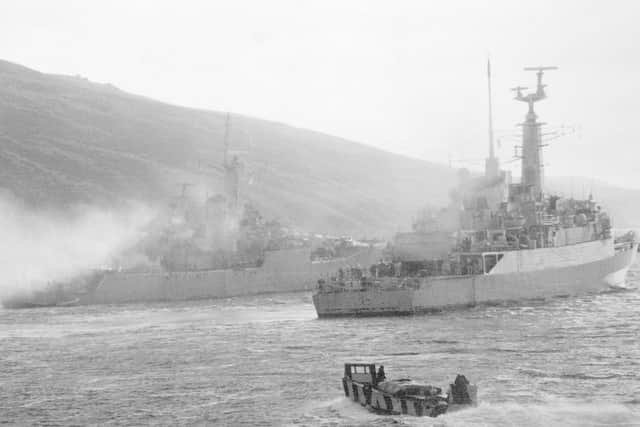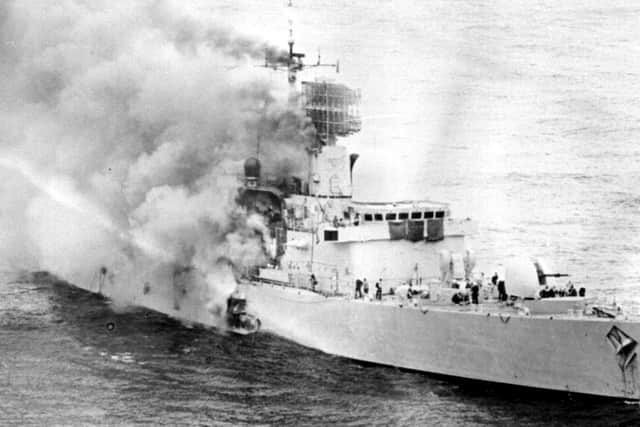Falklands Conflict: Sheffield Navy veteran shares his memories of 1982 on board HMS Plymouth
and live on Freeview channel 276
The former Chaucer school pupil joined the Royal Navy as a junior radio operator in 1977 and so had already done five years’ service before the start of the conflict.
Most would be surprised to be called to arms, at short notice to fight on the other side of the world, but this wasn’t so for Darren.
Advertisement
Hide AdAdvertisement
Hide Ad“We didn’t really get the call as such,” explained Darren. “We were doing an exercise in Gibraltar, with a lot of ships.


“We were due to sail to the West Indies on deployment and all the other ships were going back to the UK, or other areas.”
It soon became apparent to Darren and the rest of the ship that they weren’t on their way to the West Indies as scheduled.
Darren recalled: “We left Gib and started going south. The skipper knew by this time, and because I was in the radios I got an inclination.
Advertisement
Hide AdAdvertisement
Hide Ad“Instead of turning left or right to the West Indies we carried on going south, so by then I knew it was going on.


“The ship’s exercising and practising war themes increased, which you do anyway, but on our way down we did a lot more of it.”
Darren’s ship continued south, increasing their training, and intensity.
“We were already preparing for it, even as we’d got to Ascension Island, which was right in the middle.
Advertisement
Hide AdAdvertisement
Hide AdAscension Island is a halfway point between the UK and the Falklands used by British armed forces as a staging post en-route.


“Once we’d left Ascension, by now everybody knew what was going on.”
Before arriving in the Falklands Islands, Darren’s ship HMS Plymouth, along with HMS Antrim and a support ship from the Royal Fleet Auxiliary, went to the island of South Georgia.
South Georgia is a British colony nearly a 1,000 miles south east of The Falklands.
Advertisement
Hide AdAdvertisement
Hide AdGeorgia was the scene of the first incursion on March 19 1982, by the Argentine forces masquerading as scrap metal merchants, raising the blue and white flag of Argentina.
Plymouth and Antrim’s first mission was to secure the island, and once South Georgia was secure, the small fleet set sail for the Falklands.
“We were the first main troops in the war zone, other than a submarine, which was already in the area,” said Darren.
One of HMS Plymouth's main tasks was that of anti-submarines, and gunfire support.
Advertisement
Hide AdAdvertisement
Hide AdDarren said: “One of our main jobs out there was obviously anti-submarines, because that’s what our ship was, and Naval gunfire support.
“We were particularly good at that so we were called on quite a bit.”
Although highly trained, during a real life battle situation every serviceman will have a range of emotions,and reactions which can’t be replicated in any training exercises.
Darren said: “For me personally, I didn’t really feel any different, other than you’re more tense rather than anything else. Because your mates are all around you, all the lads are there, you weren't thinking of anything else.
Advertisement
Hide AdAdvertisement
Hide Ad“I know you hear people say ‘we're trained to do a job’, and it literally is what you're trained to do.
“The only time anybody on our ship was really, really affected was when we were in ‘Bomb Alley’ [San Carlos Bay] and we went out to do some gun fire support.
“Then we got bombed. I can’t remember what type of aircraft they were but four or five aircraft attacked us.
“Bombs blew up in various places, but no one was seriously injured on the ship, which was ridiculous, so we were very lucky.
Advertisement
Hide AdAdvertisement
Hide Ad“Of all the aircraft which attacked the fleet in Bomb Alley, on that particuar attack, none of them survived.
“All the aircraft that attacked us, every single one got shot down.
“Obviously other ships were in Bomb Alley and they came and helped us put out any fires out.”
As well as fires on board, Plymouth had a 1000lb Argentine un-exploded bomb onboard, which had been dropped by an Argentine aircraft.
Advertisement
Hide AdAdvertisement
Hide AdDarren recalls: “A couple of guys threw it back out the hole where it came in basically.”
The crew had little time to reflect on the events of the day until later.
“The only time was afterwards when you sat down in the mess, and you contemplated what happened, that was probably the only downer.”
He has memories of other dramatic events during his time in San Carlos Bay.
Advertisement
Hide AdAdvertisement
Hide AdIt's accepted that members and ex-members of the armed forces feel their arm of the armed forces is ‘the best’ and this can be friendly rivalry or even, on occasion come to blows.
However during the conflict those rivalries very quickly disappeared.
“It’s hard when you see mates, good mates, because they are your mates.
“We all took the mickey out of the RAF and Army but as soon as you’re together they’re all our mates – everything changes.
Advertisement
Hide AdAdvertisement
Hide Ad“As soon as something happens, a ship gets hit, catches fire, and you can’t do anything about it.
“Obviously we went alongside Ardent to try and put out fires, but even then we had to leave in case they blew up which could cause us to blow up.
“The other things is like, when you saw Avenger, Ardent and other ships which had caught fire and sunk in Bomb Alley and you couldn’t do anything about it, that was more difficult.
“I had quite a few friends, I knew quite a few communicators – radio people – on HMS Sheffield.
Advertisement
Hide AdAdvertisement
Hide Ad"I had a lot of friends on HMS Coventry, friends we’d seen in Gibraltar before we sailed.”
HMS Coventry was sunk by the Argentine Air Force on May 25 in San Carlos Bay with the loss of 19 crew and 30 injured.
One of the wounded, Paul Mills, suffered complications from a skull fracture sustained in the sinking of the ship and later died on March 29 1983.
After an intense, difficult conflict with many acts of bravery and loss of life on both sides, the Argentine forces raised the white flag over Port Stanley on June 14 1982.
Advertisement
Hide AdAdvertisement
Hide AdGeneral Mario Menendez surrendered to Major General Jeremy Moore.
Darren said: “It was just great when it finished, it was nice to get home.”
Due to Darren's position as a Radio Operator on board HMS Plymouth he was able to find out earlier than most that the Argentine forces had surrendered.
“That’s always been one of the perks of the job,” he said.
“Being a communicator we always tended to find out first.
“The bosses wouldn’t leak everything, but they’d give you hints of what was happening, it was good.
Advertisement
Hide AdAdvertisement
Hide Ad“The Falklands (conflict) wasn’t that long when you thought about it, but it felt like a long, long time.
“I can’t remember the exact date the Plymouth started back to the UK … but it was pretty much once it had finished, when they’d surrendered.”
Darren remembered his ship and the nation had double cause to celebrate on their way back to the UK.
On June 21 1982 Prince William, The Duke of Cambridge was born.
Advertisement
Hide AdAdvertisement
Hide AdDarren said: “Charles and Diana had their first child, we did a splice the mainbrace, so we had two splice the mainbrace in a couple of weeks.”
Splice the mainbrace is an order given aboard naval vessels to issue the crew with an alcoholic drink.
From Gibraltar HMS Plymouth set sail to Rosyth Naval base in Scotland, the ship and crew’s home base.
“At the time I didn’t know, and I don't think anybody else knew who was coming to visit,” said Darren.
“For me it was my mother, my sister, stepdad and granddad.
Advertisement
Hide AdAdvertisement
Hide Ad"Once we got alongside, there were thousands of people, absolutely thousands.
“I was quite lucky because we were all lined up on the side of the ship, and I saw them.
“Once we’d met everybody, we all couldn’t all just go straight home like most people did, we had to de-ammunition the ship the next day, because we’d not had time to get rid of our bombs and stuff.
“We’d been blown up, the ship needed to go into dry dock, to get sorted out properly.
Advertisement
Hide AdAdvertisement
Hide Ad“So we had to get rid of everything, all the weaponry, all the bombs had to go, everything.
“I was lucky, my dad actually came up with his missus the next day and we managed two weeks’ leave.”
After a tough, difficult campaign Plymouth needed some essential maintenance.
“It was just a rust bucket to be honest, when we’d got back,” said Darren.
Advertisement
Hide AdAdvertisement
Hide AdAnd when he finally got back to Sheffield, he received, as many other members of the armed forces did, a hero's welcome.
“Everywhere I went, all on my estate on Winn Gardens, there were loads of banners everywhere saying ‘Welcome home’.
“The hardest thing when I got back, was spending money. If I went into the pub everyone wanted to buy me beer.
“There were banners all over Sheffield to be honest.
“My next door neighbour but one, he was also down there, he was on HMS Fearless.
Advertisement
Hide AdAdvertisement
Hide Ad“They’d got banners all along our road, our road was full of banners for us.”
And regarding the Argentine forces Darren had been at war with?
“There are no ill feelings, we just got told to do what you do, that’s it,” he said.
Post war for some of Darrens ship mates and friends, the war was a turning point.
Advertisement
Hide AdAdvertisement
Hide Ad“After the Falklands, I knew quite a few communicators who’d had enough. They didn’t want to do that sort of thing anymore.
“Anyone, hand on heart, you didn’t join up to go to war. I don’t care what anyone says. You joined up to go around the world.”
Darren left the Royal Navy in 2000 after 23 years’ service.